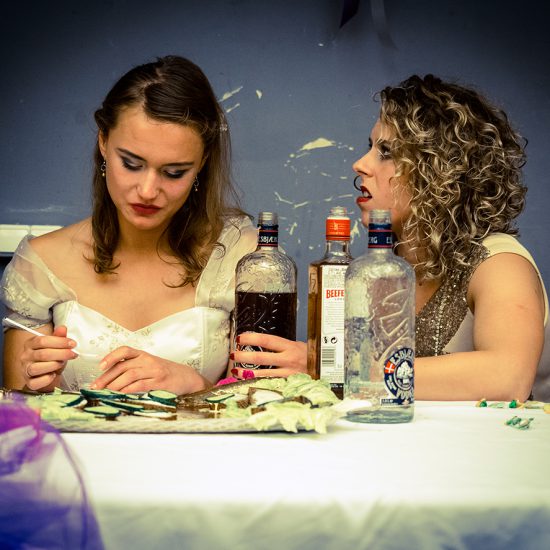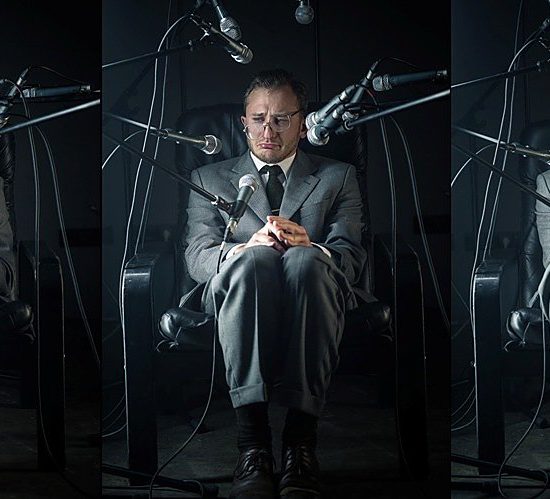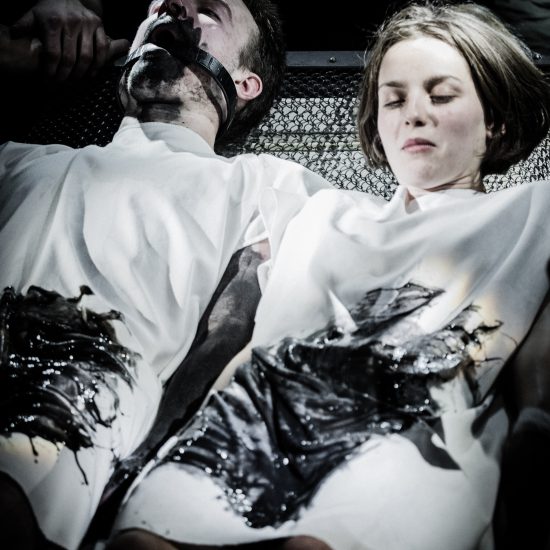A few impressions of “Cleansed”, the latest production of O. Koršunovas
The latest production of Oskaras Koršunovas, “Cleansed”, based on the play of the same name by S. Kane surprises not so much with its violence or brutality, the topic most commonly discussed in reviews of the play’s work-in-progress, but with the courage and depth of the issues it raises. The viewer is forced to restructure what for centuries was fundamentally considered a European identity. “Forbidden” topics, awkward situations, and “wrong” choices have long been considered as elements destabilizing the system of the society, its harmony and self-identity. Speaking about love, it’s just asking the “right” questions about the “right” kind of love: love between a man and a woman, a love having a few standard endings. But God forbid, not love between brothers and sisters, same-sex love, or love between people living in situations of impossible social and cultural exclusion. Questions about the above-mentioned kinds of love are uncomfortable, they do not have the “right” answers and in abstract view destroy the “orderly” routine. The director’s choice to direct a play by the scandalous playwright S. Kane, takes us down new paths: the time has come to ask uncomfortable questions, give the audience shivers, have it confused and left without answers. Even the wisest part of the audience. In part, this requires enormous inner maturity from the audience and also may be a way of treatment of a homophobic society, as well as a deconstruction of the grotesque twenty-first century illusion of progress.
It is a confrontation with oneself and the modern world. In the mirrors of “Hamlet” the actors looked for answers to the question “Who am I?” while in “Cleansed” the question is addressed to the audience, the spectator. “Who are we?” if our allegedly cultured and educated society allows the existence, albeit hypothetical, of the teacher-doctor-intellectual executioner portrayed in the play. In the play, though not directly, the emphasis is on the age-old problem of European culture: does education make a person more human? If not, what is all this worth? It seems that the play offers a negative answer: education does not make the doctor more human, on the contrary, the power to kill makes him feel superior, omnipotent. In other words, in spite of his high IQ and education the doctor is overwhelmed by pride and cruelty; another of his distinct features is his inability to love.
The strength of the production lies in the fact that one does not need to do a lot of consistent analysis of theatrical symbolism, the amount of which in this play, perhaps deliberately, is rather moderate this time: a claustrophobic space, chalk inscriptions on the walls made by the repressed people (an allusion to concentration camps and prisons, we may compare it with P. Almodovar’s “The Skin I Live In” and the writings on the wall made in the film by the prisoner and victim of the forced sex change). The prototypes of concentration camp gas chamber guards, torture tools scattered on the stage, a strange refrigerator, giving us flashbacks to the scariest of the horror movies, a baseball bat as a symbol of “changing” the “wrong” sex, black paint symbolizing death, a metal bed used for tethering and battering the patients, the sound of a body being beaten with wet rags which is a direct allusion to flogging. In the play the audience needs to succumb to emotions, the actors’ close proximity, and the impression created by the confined space, which etches in the memory much deeper than an active reflection on the symbols.
The play has two main and most shocking ideas: the limits of human experience and the versatility of love. On the one hand it questions the very morals, Christian truths and fundamental concepts of modern Europe. On the other hand, it is very Christian, postulating love as the only way of salvation. In the play the mirror principle is used to ask what is this “moralizing” and “sanctioning” society which, as per Foucault, operates according to the principle “Discipline and Punish”. Is the doctor, an educated person who has taken the Hippocratic Oath, a noble human being who wants to help others? The doctor, who is in a psychiatric hospital-university-concentration camp ostensibly trying to “convert” the prodigal is himself unable to love (when the stripper says “So, love me,” he appears to be incapable of loving the other) and therefore he suffers terribly.
As Koršunovas’ play shows, any love, as long as it’s true and committed (as in the case of Carl and Rod or Grace and Graham), purifies, redeems and cures. Here lies the greatest paradox: should we pretend to follow the tradition and nod in agreement to universally accepted norms that incestuous relationships are illegal and therefore bad or try to see each situation as it opens to us, here and now. In other words, to move away from the common experience of humanity, or to rely solely on our own experience? Which is the right way? Both S. Kane and O. Koršunovas very directly lead us to the idea that there is no single correct answer. The answer depends on the person and the context.
Another important aspect of the performance: the deconstruction of the body cult. The body, which in the performance is represented by pornography, constantly watched by the doctor, and physicality in general (most of the actors, who, incidentally, have no complex psychological characters, are wrapped in bandages like some bodiless injured creatures) are presented as negative aspects of human existence, especially when they are identified as the only condition to exist. In the play nonlove is likened to the body. Living in an era when the body, the beautiful body, is a religion, this statement is shocking, forcing us to shake our heads and feel some kind of nausea. All the truly loving characters in the play either are disabled or killed by the sadistic doctor, in other words, they lose their body. Meanwhile, the body of the doctor, who loves striptease, remains unchanged, unharmed, but unable to love. He lives in nonlove, but retains his body. This moment in the play grasps the foundation of modern societies, the fact that body and love may have absolutely nothing in common. Because love transcends the body, it is eternal. This is evidenced by Grace’s communication with her dead brother, their relationship and conversations, when his support from the other side helps Grace to survive the nightmare of the hospital and medical experiments (forced sex change). Rather paradoxically in this aspect the play appears to be Christian: Jesus’ sacrifice of love was his body and death. Similarly, in the play the sacrifice of love is the torture of the body and, finally, death.
The play not only reflects the latest European art trends (we should remember G. Noe’s film “Love”, “The Skin I Live In” by P. Almodovar, M. Haneke’s “Love” and many others), but also creates a situation of “painful theatrical experience” which encourages contemplation and is hopefully bound to bring about a new quality of thinking. In other words it carries out the function of “purification through art”, sought by the Ancient Greek theater.
An uncomfortable play for a comfortable society. Brutal and painful because it doesn’t let us remain “on the other side”, among the indifferent audience. The answers must be given here and now. And most importantly – by one to oneself.
****
Akvile Simeniene, bernardinai.lt, 28th January 2016



